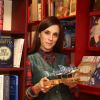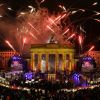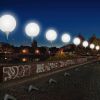No Young Pioneer’s badge
Angie Pohlers was born in eastern Germany the year the Wall came down. How has she experienced the growing together of East and West?

Grandmothers tell stories about the past. Mine does that too. She told one of her anecdotes in the mid-1990s, probably after I’d started school. She talked about the GDR, the country in which I was born in 1989, and where I spent the first few months of my life. As part of her tale, she explained that once there was a wall, and people couldn’t get out. I was baffled. “You mean like horses in a paddock?” Even after that I had difficulty understanding what my family’s life was like before I was born. Before the Iron Curtain fell.
The GDR was far away, and yet still very present
For me, the GDR was always a strange, absurd world that seemed far away. And yet, it is still visible. At a very personal level, it’s a tiny vaccination scar on my arm. Someone the same age as me, and who has one of these, probably comes from the East. And the GDR is reflected in my first name as well. As a name, Angie is like Cindy, Nancy, Jessica, Ronny and Mike, because they all symbolize our parents’ longing for things like Nike trainers and MTV stars. They’re names that people like to make fun of now, but they are really expressions of a dream. A dream that eventually came true: the turning point, freedom, package tours. And sometimes a nightmare: structural change, unemployment, shattered biographies. And the children in the midst of it all.
I’m the first person in our family without any knowledge of Russian, and the first with friends around the world.
The East never became a duplicate of the West
We post-GDR youngsters have heard innumerable tales about the times before 1989, and to this day we are still experiencing the ongoing differences between East and West as cultural and economic environments, especially because we have many friends whose families come from the West. We had teachers who shouted “Sport frei!” at the start of a lesson. We have grandmothers who read SuperIllu every week. And terms such as “Wessi” and “Ossi” were, and still are used quite naturally in family conversations.

Religious education lessons were offered at primary school, but none of us in the north-east went to them. After all, 40 years of atheist Marxism-Leninism had left its mark. Instead, we had substitute lessons for religion. We crocheted “oven cloths for Mummy“. As for Mummy: mine went to work, a lot. When a friend from Mannheim in western Germany told me that her mother stayed at home with her and her sister for years, I looked at her rather blankly.
The first generation without the Wall
Although the GDR is still there deep inside me, growing up was far different for me compared with my parents and grandparents. I was the first without a Young Pioneer’s badge, the first high school graduate and university student. The first not to learn Russian, the first who spent a school year abroad. The first with friends throughout Germany, and friends around the world. The first real European, the first to feel like one.
You would like to receive regular information about Germany?
Subscribe here:


